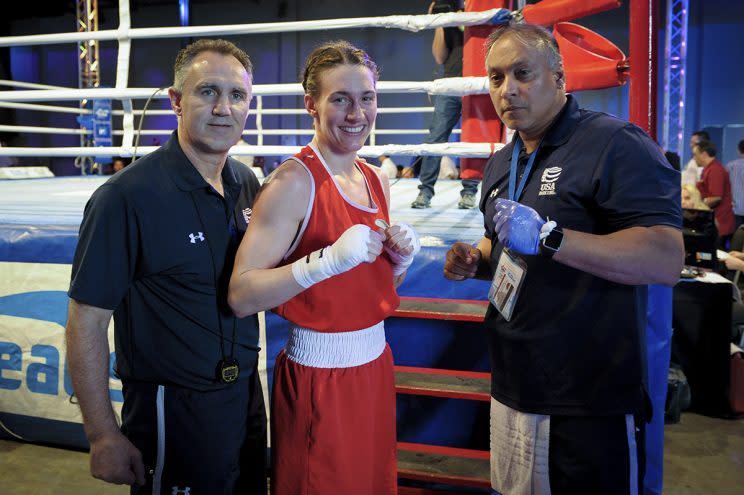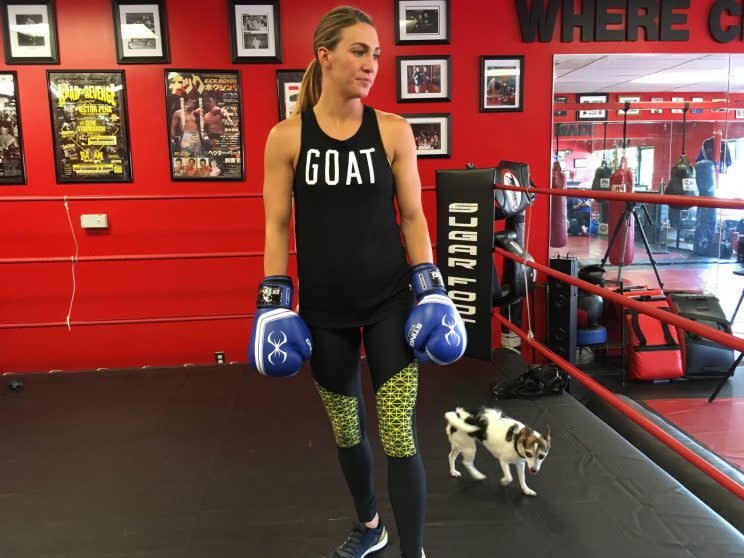How model-turned-Olympian Mikaela Mayer got whipped into shape


Iron Lady wins in an upset | King wins battle of USA vs. Russia | Murphy sets Olympic record
RIO DE JANEIRO – Al Mitchell had made up his mind and he wasn’t about to change it.
Mitchell proudly says he is “old school,” and no matter how much Mark Mayer pestered him about training his daughter, Mikaela, Mitchell wasn’t going to cave. He didn’t train women and that was that.
Mitchell is 71 now, and one of the country’s esteemed amateur coaches. He learned boxing in the notoriously tough gyms in North Philadelphia, from where so many hardened professionals emerged.
He grew up desperately poor, wearing pants his mother purchased for 75 cents at a second-hand store, or twice that if they had no holes. He learned to fight because a bully used to mug him on his way to church and take the few pennies he had in his pocket.
Mitchell had his way of doing things, which had proven to work, and they didn’t involve teaching women to fight.
He was the head coach of the 1996 U.S. Olympic boxing team. He was a technical adviser on the 2004 and 2012 U.S. teams. China had spoken to him about coaching its Olympic team and he gave many seminars there. He coached numerous successful pros, including the late Vernon Forrest and David Reid, a 1996 gold medalist.
It was hardly uncommon for a parent to reach out to Mitchell, asking him to teach their child to box.
Mitchell wasn’t interested in training women and he said that no matter how often Mark Mayer asked, he wouldn’t change his mind.
“My father’s dead, but if he heard I was training a girl, he’d turn over in his grave,” Mitchell told Yahoo Sports.
But Mark Mayer proved persuasive. He wouldn’t take no for an answer. Eventually, Mitchell melted under Mark Mayer’s full-court press and he told Mayer to send Mikael to see him at the now-closed U.S. Olympic Education Center in Marquette, Mich.

Mikaela Mayer was once a party girl who wanted nothing more from life than to have a good time. She dreamed of being a model, but mostly, partying was on her agenda.
When she was 17 and with no obvious direction in her life, she somehow happened upon a kickboxing gym in Southern California and waltzed inside. She can’t explain why to this day, but it was a fortuitous choice.
Now, nine years later and with a lot of assistance from a guy who once turned up his nose at the thought of training a woman, she’s not only a member of the U.S. Olympic boxing team, she has a shot at a medal in the stacked lightweight division.
“She’s got the tools,” said Team USA coach Billy Walsh, who coached the reigning gold medalist, Ireland’s hugely popular Katie Taylor, at the 2012 Games in London.
Even Mitchell would relent and concede that, when she arrived in 2010, he wasn’t sure he’d made the right choice. She lived with Mitchell and his fiancée, Cindy Cartwright, though she didn’t strike Mitchell as a boxer at first glance.
“I went to pick her up at the airport and I saw one of those California skinny girls,” Mitchell said, in what decidedly wasn’t meant to be a compliment. “I said to myself, ‘Boy, what have I gotten myself into? I’m training a girl, and it’s one of these California beach girls.’ ”
He eventually warmed to her, though, so much so that Mayer now has Mitchell’s initials, “AM,” tattooed on the outside of her right hand. She did that in November, just before she left Mitchell to train full-time at the U.S. Olympic Training Center in Colorado Springs, Colo.
The grizzly old coach and the one-time California model hit it off quite well. It turned out Mitchell was more open-minded than he thought, and that appearances were deceiving. Mayer may have looked like the model she aspired to be, but she could fight.
Mayer wanted to get better and wanted to do something great, and she was open to doing whatever Mitchell asked, even knowing that he didn’t particularly want her around in the first place.
“My dad called him and called him and said, ‘Listen, I know you don’t have any women in your program, but women are allowed to compete in the Olympics now. You have to take my daughter. You have to take my daughter,’ ” Mikaela Mayer said. “[Mitchell] was hesitant at first because he’d never trained a woman like that.
“I went in there and I was like a diamond in the rough. I thought I was decent, but he broke me down. I don’t think he really expected me to come into what I’ve become, but I think I really surprised him at the 2012 Olympic trials.”
She didn’t make the team but came extremely close, and she impressed Mitchell enough with her skills, her conditioning and her smarts that he quickly believed that not only was it possible for her to make the 2016 team, it was probably likely if she stayed on the same track.
He stresses fundamentals in his training, and preferred young students whom he could mold. Mayer, 26, was 20 when she joined Mitchell.
“I like the 13-, 14-, 15-year-olds because they don’t think they know it all and they want to learn,” Mitchell said. “Mikaela had to do that same thing. I had to break Mikaela all the way down. And I’ll be honest with you: Sometimes she got frustrated with it. But when she did good, I told her. I hugged her and told her, ‘Great job.’ When she did bad, I jumped on her, but I always made sure to tell her the good things she did first.”
It might have been 20 percent good and 80 percent bad at first, but she proved to be an adept athlete and an eager listener. She quickly began to turn that around, to the point where he had to nitpick a bit to find mistakes.
[Related: Inspired by Muhammad Ali, Claressa Shields chasing history at Olympics]
Mayer is eager to get onto the podium, and has the ability to do it, her coaches concede. Her dreams are broader, she says, than her own personal self-interests.
While there is plenty of money for women professionals in mixed martial arts – Forbes estimates that UFC superstar Ronda Rousey has made eight-figure incomes in each of the last two years – such is not the case for women’s boxers.
Women’s pro boxing is almost never on television and promoters don’t invest much in it. Mayer aims to change that, and thinks the success she and teammate Claressa Shields, the 2012 middleweight gold medalist, have could change that.
She’s already being asked about fighting in MMA as a pro, but she’s planning to stick with boxing for the foreseeable future. She said she wants to return to fight in the 2020 Olympic Games in Tokyo.
“It’s going to take girls like me and Claressa, honestly,” to build interest in women’s boxing at the professional level, she said. “That’s why I don’t want to abandon my sport. I don’t want to turn to the MMA ranks now. Especially right now. I’m going to go for another Olympics. I want to potentially turn pro in the future and help bring attention to our sport.
“They need girls with the experience that we have and the talent that we have. I definitely feel a duty not only to myself, but to women’s boxing in America, to get on that podium. We’re an under-represented sport but we’re close. The women’s fight game is building up, especially in MMA, and we’re right there. We just need to keep pushing and do stuff like come home with medals.”
The crusty old coach who didn’t want to be bothered teaching a girl had a pacemaker inserted last year and won’t make the trip.
But he’ll be in front of the television and has no doubt good things will happen.
“She’s special,” Mitchell said of Mikaela Mayer. “A good person, a good athlete, a good student. She wanted this and she wouldn’t take no for an answer. She wasn’t going to let me or anyone get in the way of her dreams. And she’s right there now.”


